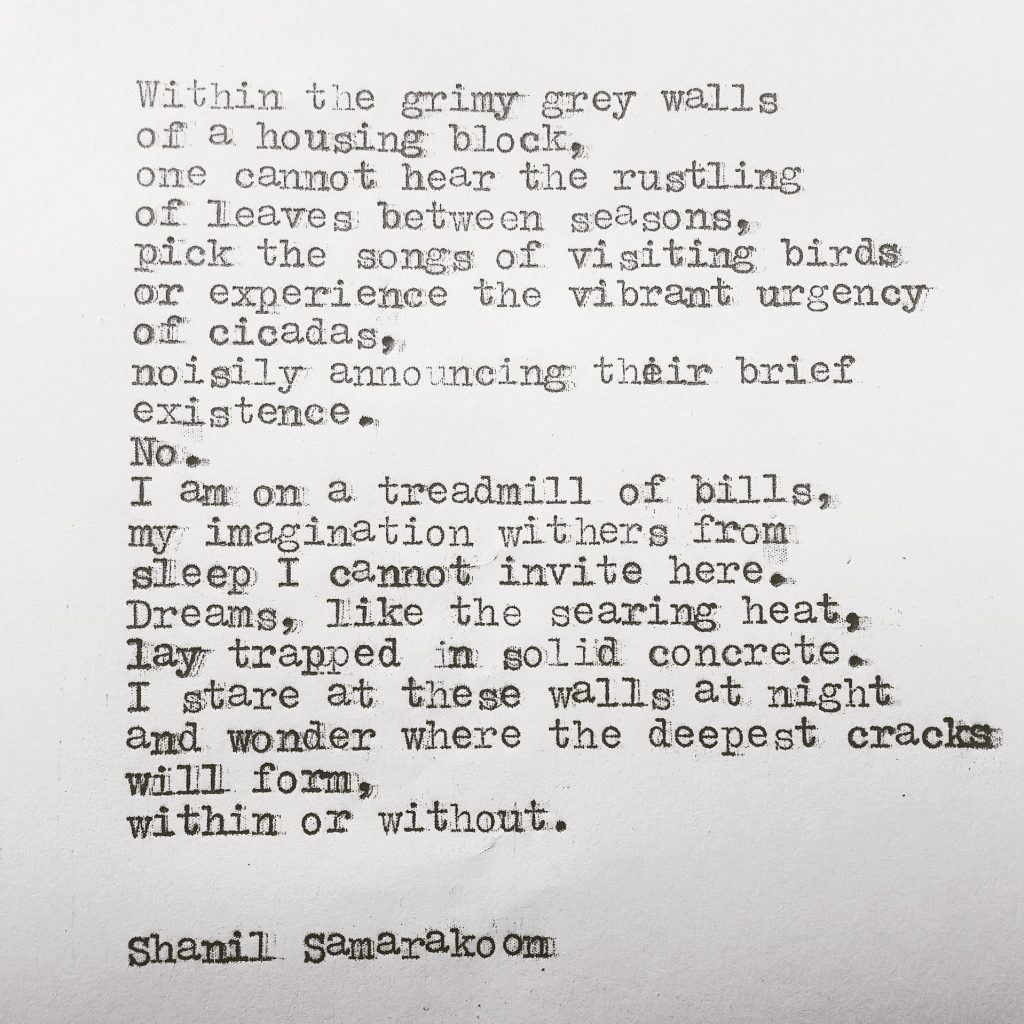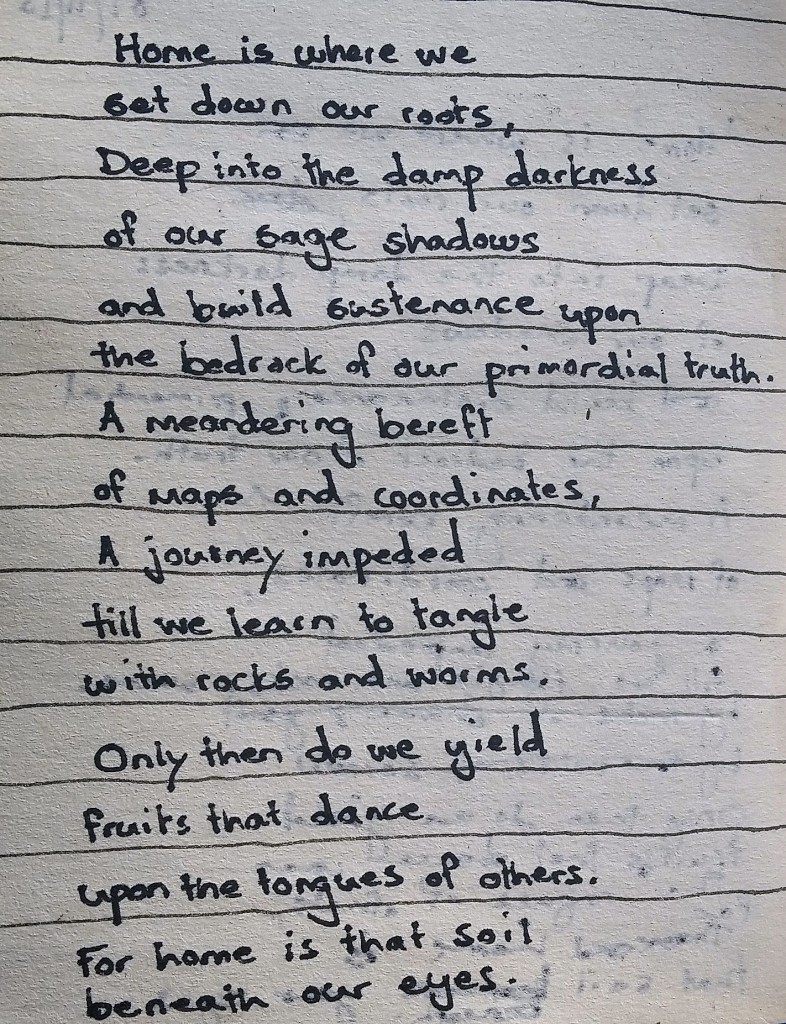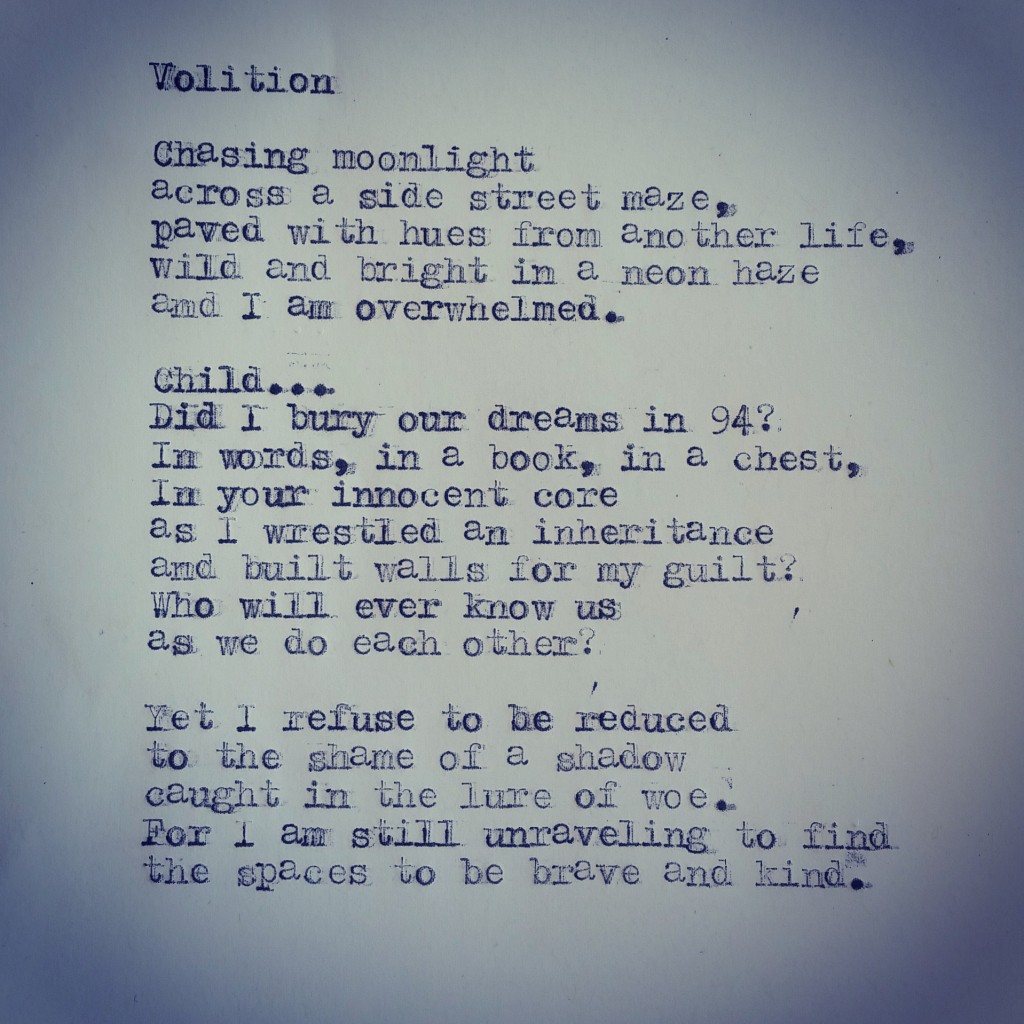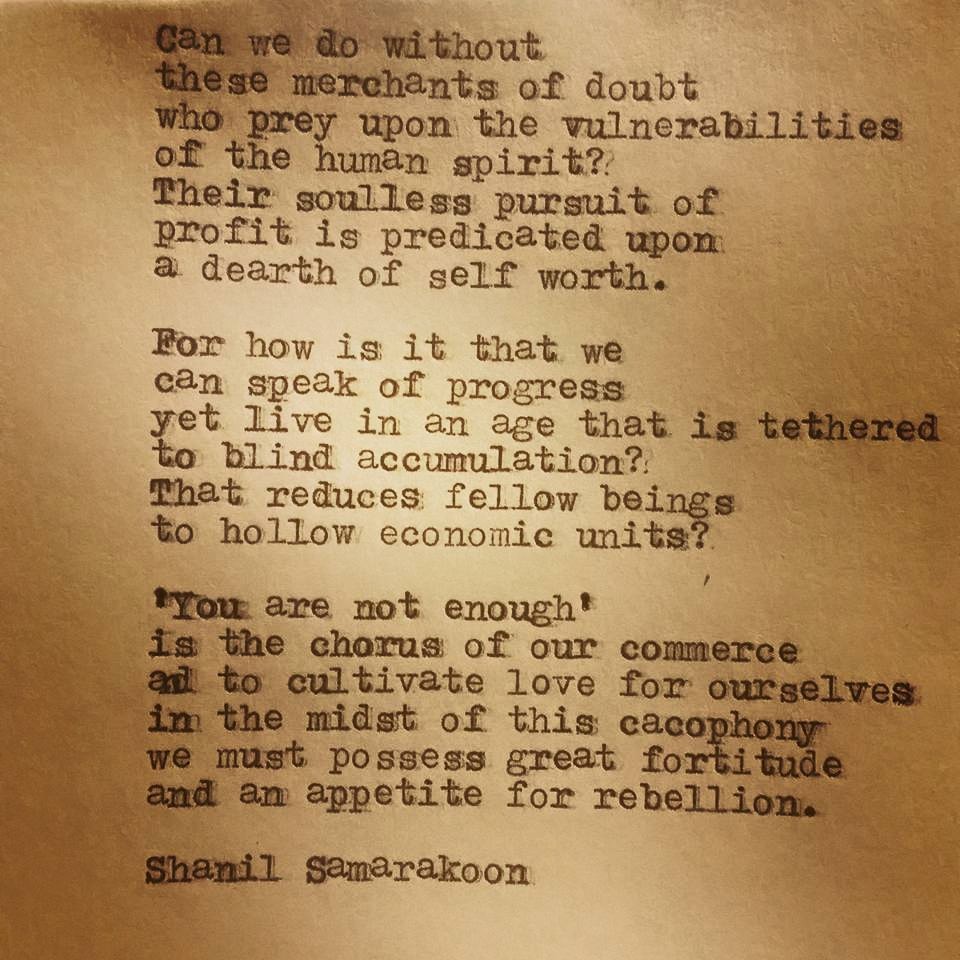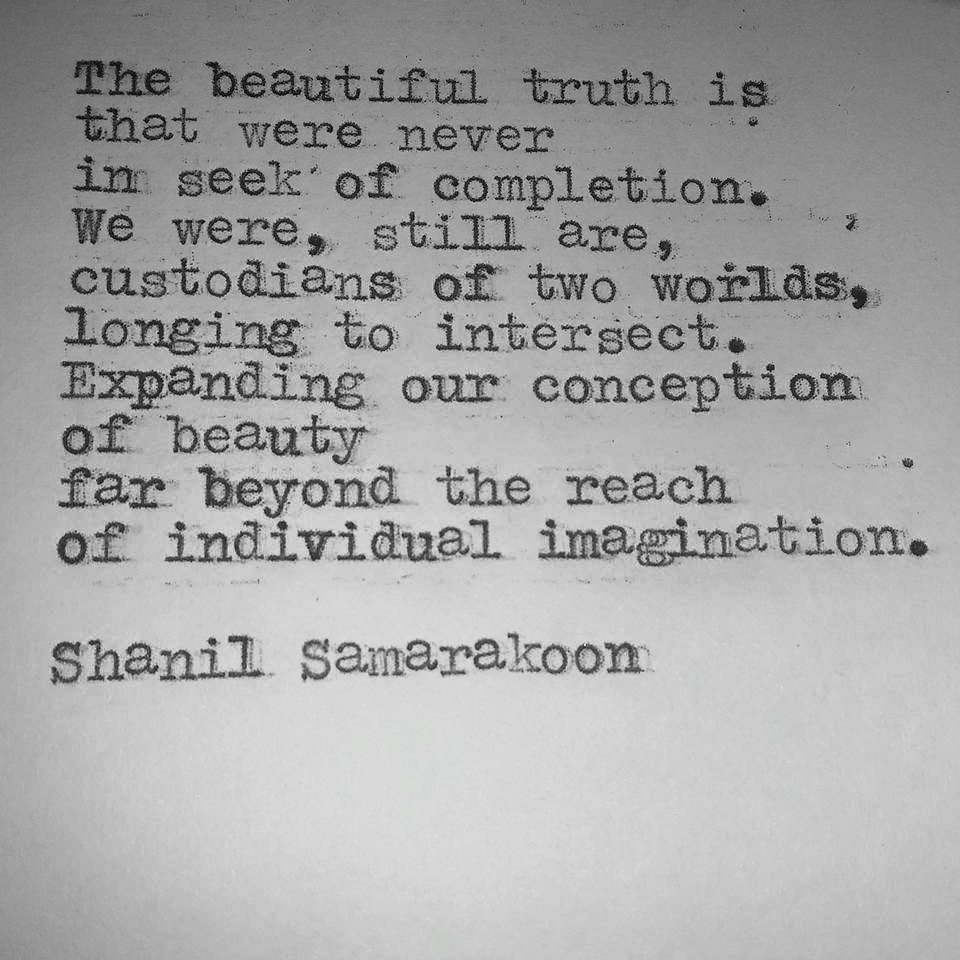Some nights I distill the foundations of my will,Tracing the depths of this yearning to be of use.
Read moreGlimmer
Doubt
I fear cold certitude more than I do the smoke of doubt.
For certainty implies a finality of knowing,
the closing of doors,
the chiseling of conclusions.
Why is doubt maligned?
Is it not both humble and honest?
It is to tread lightly through
the length of our days,
to leave doors ajar for a sliver of light,
to allow for the possibility of people
and the terrains we traverse
to transcend the limits
of what we have known.
Within or Without
Incapable
Survival Day
A poem about "Australia Day".
Read more10 Years On
A poem commemorating ten years since my father passed away.
Read moreParis - Our selective outage
What happened in Paris is absolutely horrendous. I will not pretend that I can fathom the horror experienced in those final moments or the grief that families are experiencing.
Yet let us not forget the obvious asymmetries in the valuation of human life on our planet. The stark reality is that we are not equal. As such the tragedies that erupt and befall us do not register the same response. Be it coverage, hash tags, safe buttons or swift condemnation by leaders. A very selective consciousness results.
With news at our finger tips, we are exposed to the impacts of brutality within minutes of an event. I can empathise with the scope and scale being overwhelming for an individual to process. There is untold violence and injustice that is juxtaposed against our noble ideals. There is a climate of fear and despondence that can prevail over us like a looming shadow. One might even suggest that this is precisely the intent of such attacks - to preserve a paradigm.
In contrast, there can also be great solidarity that is formed as a courageous response to violence. Perhaps it is the skeptic in me that seeks to pick at the seams. That seeks to test the true strength of our commitment to peace and compassion. For it is increasingly common for us to condemn the heinous acts of terror , at least those that are brought to our attention. Understandably, the intensity of our emotions wither in the ensuing days, weeks and months. For to even entertain the scale of the violence we inflict upon each other, both physical and psychological, could leave us utterly despondent. I am not suggesting that we ought to strive for symmetrical outrage across all tragedies that occur. That is an odious aspiration in my view. We can and must do better.
I remain interested in how we think and behave in the aftermath. Before the seemingly inevitable tragedy that will follow. Do we accept it as part of our nature? Do we , rather naively I might add, frame this as a battle between good and evil forces? Do we fan the flames of bigotry and prejudice, against Islam for instance?
If we are truly committed to being custodians of peace for all, we must be relentless in our passion to bring it to life in the day to day. Be it in our interactions across difference, in the ideas we promote, the policies we support and the lifestyles we lead. For we are often unsuspecting participants in this paradigm. Through the militarization we support, the poverty we ignore and the inequity we promote and the vulnerable we denigrate. Beyond expressions of sympathy, we must be authors of a new story.
Finding Home
The Examined Life
There is a claim that is attributed to Plato- "the unexamined life is not worth living". While one might argue that this claim is laden with rhetorical flair, it is a nonetheless one that resonates with me in that I feel that it stresses on the importance of making conscious, value-based decisions in our lives. This is without doubt an life-long process, one in which we have to consistently check in to gauge whether we are leading lives in alignment with our values. Where we may have to shift our stances and practices in light of new knowledge and/or shifting circumstances. As a leader of a sustainable development organisation and an academic involved in furthering ethics and sustainability education, I'd be amiss if I did not scrutinise my own actions (or inaction) as an individual.
What I intend to share with you through this post, is a window into some of the key ethical choices I have made and some of my (many) failings. I would like to state from the onset that these choices are ones I have made in accordance with my values, my lived experience, conversations with others and secondary research. As described earlier, this has been an incremental process, layers built over several years of self-examination. I do not intend to contend that these are THE ethical choices that individuals need to make. Rather, I am more interested in a genuine exploration of the alignment between ones espoused values and the actions we do or do not take part in.
It is my hope that this window, admittedly focused on the practicalities of daily living, provides some food for thought ...perhaps even some inspiration for action! For the sake of simplicity, I will divide this entry into two main parts - "The Aligned" and the "Misaligned", though as is often the case in life, there are instances where there is both alignment and misalignment within the same category!
The Aligned
Community Service
As I come from a family of teachers and have had (for the most part), a Buddhist upbringing , the value of service to community was instilled in me from a very young age. In Sri Lankan culture, there is a concept called Sharamadana which translates to "sharing ones time, thought and energy for the welfare of all". Volunteering is a key manifestation of this intent. This is an aspect of my life that I feel is well aligned. Thus far I have contributed thousands of hours of voluntary service to various community initiatives, the establishment and management of Empower Projects and mentoring both students and social entrepreneurs like Nathan Basha. Beyond it being a point of personal pride, I sincerely feel that these hours have been some of the most fulfilling hours of my life thus far. My personal approach to life is centered on an intention to live a life of contribution.
My Commitment to Friendship
This is an area of deep significance to me as I've had the benefit of some wonderful friends in several countries that have helped me overcome many personal challenges. In fact one reason I feel particularly strongly about cultivating strong friendships is because I suffered from depression (mild) in my undergraduate years. Without descending into great detail, one of the driving forces behind me overcoming this, was the presence of friends who were open to real conversations. What do I mean by "real"? Well conversations that transcend polite niceties, forced positivity or mundane (in my view) exchanges of pop culture. Ones in which I could express myself freely, especially if I was despondent or upset without feeling as though it was an imposition, a "buzz kill".
As such I am very conscious of making time for my friends and forging honest relationships. I am fortunate that I have many good friends, but I have fairly clear circle of friends that I meet regularly to check in and even use tools like this to discuss our life goals and challenges. After all, how can we be good friends without supporting each other on our respective journeys? Helping my friends make their aspirations and challenges explicit has been very valuable and often strengthened our commitment to each other. More generally, I am a heavy user of social media and while that does come with its own challenges, its been a useful way to connect with friends overseas and to be accessible to those who might need someone to talk to. To date I don't believe I've ever failed to respond to someone who needed to talk and I never intend to.
Growing Food
A huge part of our lives and one mired with ethical considerations! This is a facet of my life that I am yet to perfect in terms of alignment but I will acknowledge where I feel I am doing well. I am a permaculturalist and as such I am an advocate for locally grown, organic produce. This video by Michael Pollan does a great job of sumarising my stance.
My focus here is two
1) growing as much of my own food as possible. 2) Purchasing as much local produce as possible.
I've been especially successful with 1). We live in an apartment at the moment but grow enough herbs and salad greens to have a salad everyday! Yes. It is very possible. There's so much you can grow in a small space and there are plenty of resources out there to support you. I'm happy to be of assistance if you ever need any guidance. Beyond the environmental and health benefits , anyone who grows anything will attest to how deeply rewarding it is. There's been research to suggest that gardening has many mental health benefits as well, particularly when it is a communal /shared activity.
As for 2) this is a work in progress. While we do purchase organic produce, palm oil free, free range and fair-trade wherever possible, we need to improve upon where we purchase the majority of our fruits and vegetables e.g. local grocers vs supermarkets. The main "reason" here is that of convenience given the busy lives we lead. Yet from experience, this mainly a matter of creating a new habit.
Electricity
I am a supporter of renewable energy and I have been involved a range of renewable energy projects overseas for over 7 years now. As such the fact that I was still reliant on fossil-fuel based sources for electricity was a source of shame and frustration for me. We made the shift to PowerShop and now have access to accredited green (wind) power through this disruptive new business model. While it is a far superior alternative to the AGL connection we had previously, there is still the matter of us using gas for cooking and heating. These are largely limitations tied to living in an apartment. I harbor the hope of owning our own property and being able to generate and manager our own power.
FYI if any of you want to get $75 credit for signing up with PowerShop, shoot me an email - shanil@shanilsamarakoon.com
Waste
Again, my permaculture background has shaped my thinking around waste. I'll speak beyond the recycling plastics here. It's estimated that up to 50% of our household waste and 30% of our waste overall is organic. This is "waste" that can easily be converted to soil so that nutrients are cycled back instead of being concentrated in a landfill. I could nerd out about the specifics of organic waste but I'll hold back!
Over the last 5 years I have used either a Bokashi Bin (a fantastic guide) or a Worm Farm to process our food waste (everything except bones). I can safely estimate that I have been able to divert over 5,000 kgs of food waste from landfill. Better yet, I have used this as soil for my garden beds or those of friends and family.
There's still the matter of human waste and once again, if I ever own a house composting toilets are certainly an important consideration. As grossed out as you may be, the reality is that our urine in particular ...is an incredible source of nutrients for our soil.
Use of Public Transport
My partner owns a car but I do not. Virtually all my commutes to and from work are on public transport ( I get a lot of reading and writing - like this blog- done along the way). I'm accustomed to it despite all the flak Sydney's public transport gets. Having had to wait for buses for hours and endure consistent breakdowns in other parts of the world, I have thick skin. I must add that I've had some fascinating conversations with strangers on public transport. Most notably a Syrian refugee that I sat next to one morning. My partner and I also make it a point to cycle or walk to nearby locations for e.g. if we have some light shopping or want to grab lunch at a local restaurant. The added benefit being that we get to spend more quality time together.
Technology Purchases and Usage
My policy with technology is that I should be able to justify the utility of each purchase with at least one other person and that I/we need to use that item e.g. TV, a phone, laptop for at least 3 years. I try to obtain second hand items where possible and aim to re-use all technology. For instance approx 75% of all Empower Projects' gear are second-hand items that are in great working condition e.g. computers, phones, tablets. Reduced consumption and re-use trumps recycling.
Banking
I was a Commonwealth Bank of Australia customer for many years but decided to make the switch to a more ethical option. Primarily as I am a supporter of the fossil fuel divestment campaign. You can use 3rd party sites like Market Forces for an analysis of where your bank invests its money. Personally, I wanted a fossil free option and opted for Bendigo Bank as I also believe in community banking. This is wonderfully aligned with my values as the organisation I lead, Empower projects, is a big proponent of community banks and cooperative models.
My excuse for a while was that it was 'too cumbersome' to switch but in actual fact, it only took me a few hours to make the switch and about 2-3 weeks to shift across everything I was using my CBA account for e.g. direct debits. The process was painless and it's very satisfying to know that my pay and savings are being used for good!

Union
A more recent move I've made is to join the NTEU, the main union for universities in Australia. Amidst the often ideologically driven criticism of unions, history would suggest that unions have been a critical champion in protecting worker rights, benefits and the creation better workplace conditions. In fact much of the basic worker rights we take for granted today e.g. work hours, weekends, pay increments, anti discrimination policies, paid leave and OH&S have been championed by unions around the world. I feel a responsibility to support the growth of the union in my vocation as a weak union would diminish the voice of staff and the standard of accountability to which a firm would be held. Suffice to say, any organisation is susceptible to malpractice and I am an advocate for any organisation being transparent and accountable to its stakeholders, this naturally includes unions themselves. Incidentally, for those who don't know, the membership fees for unions are tax deductible.

Coffee
Believe it or not but a year ago I was an active user of an Aldi Coffee Capsule machine. It was a guilty pleasure, my key 'reasons' being 'taste and convenience' and while I did empty each pod of its spent coffee (into my garden) and recycle each pod ...it was not a sustainable practice.
I made the switch to Republica Coffee (Fair Trade & Organic) and in a move that would no doubt please my Italian in-laws, I now use a Moka Pot (Stove Top Coffee Maker). Note Republica do make biodegradeable capsules, but i'm happy with the switch. Nice and simple, more sustainable and cost-effective. I even bring most of my coffee in a small thermos to work, thus minimising the need to purchase coffee from cafes on campus.
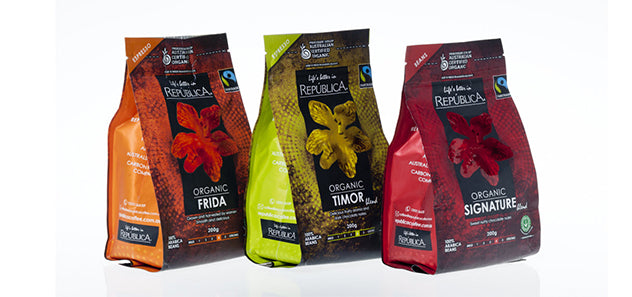

Superannuation
This is a big consideration that I have long put in the "too hard" category as it involves a fair bit of back and forth with HR in my instance (I won't get into the details). Having said that, this is one of the biggest chunks of money that is invested on my behalf and I feel an ethical responsibility to consider stewardship of these funds wisely. Particularly with respect to investing in fossil fuels and privately-run detention centres. As with my banking, I opted for a fossil free option using SuperSwitch to select Future Super as my choice.
Switching from UniSuper was a hassle! You are more or less locked in if you are staff at a University. I managed to work around this and organise for an annual rollover of my funds into Future Super. It is a bit of a pain and I still technically have some exposure to Unisuper's opaque 'socially responsible investment' option but I am happy that the majority of my funds are in responsible hands
The Misaligned
Meat Consumption
Another major area of my life that is somewhat misaligned at the moment. I grew up eating next to no red meat and a largely vegetarian diet. I have also had a few stints at being a vegetarian and a vegan but I cannot say that I am either as a firm lifestyle choice. This is a very contentious area from an ethical perspective but even if you feel that it isn't unethical to eat meat from a rights perspective (provided they are treated humanely), there is a very strong argument to be vegan or at least vegetarian from an environmental perspective. But while I mainly eat fish and chicken (less resource intensive), I do so knowing that it conflicts with my values, particularly the protection of the environment in this instance. I have become more conscious of the % of vegetarian and vegan meals that I have every week and I am fighting my reasons and rationalisations by educating myself e.g. "Once in a while is ok. We're omnivores" , "I do so much. I need the energy. Vegetables and grains alone are not enough" or "I'll have to give up those dishes I love". The transition has started and I recognise that its smarter to do this in manageable phases.
Clothing
Coming from Sri Lanka (where there is a lot of garment production), it is easy to take the availability of cheap clothing for granted without questioning the source and the implications of their low cost. While I have become more conscious of the brands I purchase in Australia post Rana Plaza and tend to wear my clothes thin (at times to my partner's embarrassment) , I feel I need to exercise greater scrutiny. For instance it is not just the matter of the working conditions of workers but fairness in terms of pay and the sourcing of materials e.g. cotton. I came across this great app that is due to be released this year called Good on You and a handy newsletter called Otter by Ethical Consumers Australia that may be of use to others like me who face challenges in being able to discern how different brands rate in terms of their practices.
Air Travel
This is a difficult one for me! I run a for purpose organisation overseas, have family overseas and am in a relationship where we both want to see as much of the world as we can before we settle down and potentially start a family. We have now set up Empower Projects so that I am only required to make annual trips and that too is going to be extended to a trip every 18 months. My mother lives on her own so I feel it is difficult to compromise on making less than an annual visit to see her in Sri Lanka but I have plans to bring her over to Australia in the next few years which could reduce the need for me to travel as often. As for travelling beyond, we will look into staggering visits, carbon offsetting and focusing on greener options in-country.
Supporting Local Artists
As an indie writer myself, I feel I could be doing more to support local artists. While I feel I do a good job of purchasing goods from artists when travelling, I could be doing more to support local artists in Sydney. For instance I rarely attend events or promote the work of my contemporaries and can be rather focused on my own craft. Knowing the challenges of independent artists, I feel that I need to lead by example and commit to looking beyond my craft and actioning greater solidarity with fellow writers and poets at the very least. The main excuse here is "time" , one of the most common and formidable reasons for inaction. I make annual goals and I am a big believer in "if its not measured, it doesn't get done". I will set a goal of attending at least 3 events a year and giving other writers a shout out on my social media platforms at least once a month.
Well...that's the end of this (limited) window into my ethical choices! I hope it has been of value to you. Please feel free to ask questions, make comments or offer suggestions.
Over and Out,
Shanil
Boundless Plains
Drowned. All sparks extinguished.
Swallowed by brutal oceans.
Corpses by the shoreline.
A few of many.
Read moreVolition
Merchants of Doubt
Bernie vs. The Oligarchs
Who is Bernie Sanders you ask?
For those unacquainted with American politics, he is a Vermont Senator that is challenging Hilary Clinton for the Democratic nomination in the 2016 Presidential Election. The longest serving independent senator in the U.S. congress and he is a man I have admired for many years on account of his passionate stances on a range of issues - climate change, income inequality, financial reform and foreign policy being some key areas. His near 9 hour filibuster of Obama's continuation of Bush-era tax cuts to the wealthy being but one example of his passion to support the working class. Along with Elizabeth Warren, Bernie Sanders has been one of the few consistent voices of reason within a political system that appears out of touch with the daily struggles of the lower and middle class, one utterly compromised by the greed of corporations and high net worth individuals like the Koch brothers. I have long felt that for better or worse (more of the latter), American politics has a huge bearing on the rest of the world. It is with this in mind that I am watching this presidential campaign with great interest and I daresay ...hope!
A self labelled "Democratic Socialist", Bernie is calling for a "political revolution" and often looks towards Scandinavia for inspiration (e.g. taxation, education, healthcare). While "socialism" seems to be a dirty word in American politics, the Republican candidates thus far (all 12 of them) appear to be so entrenched in far-right politics (billionaire financiers, climate change denial and trickle down economics in tow) to have a serious chance of defeating a Democratic candidate next year. So while it is early days it does indeed appear to be a battle between Bernie and Hilary Clinton for the U.S. presidency. The Daily Dot has a great summary of some of the key policy differences between Sanders and Clinton. For progressives, it ought to be abundantly clear that it is Sanders who has the authentic track record. Be it his stance on big banks, electoral reform, same-sex marriage, climate change, Keystone XL, on the Trans-Pacific Partnership, healthcare, mass surveillance or the 'war on terror', it is all remarkably clear and consistent. The same cannot be said about Hilary Clinton. Or the vast majority of politicians across the world for that matter. The regressive, wildly inconsistent Abbott Government here in Australia being a case in point.
But let's face it, there is a much greater battle playing out here...and this is what moves me the most.
It is a battle against a powerful, maniacal, greedy elite who have hijacked governments and hence the system of rules (or lack thereof) that determine how we function as a global society. An oligarchy. Before you conjure images of me being a conspiracy theorist, I invite you to reflect on the extent to which big business and wealthy elites hold the reigns when it comes to political decision making. Whether it is media control, flagrant campaign financing, lobby groups or intense business-government collusion in policy development. A paradigm that has unsurprisingly resulted in inaction when it comes to climate change, growing income inequality and of course the denigration of all social services to the majority while insisting on tax breaks, loopholes and subsidies for big business. Thus a context in which we talk about about 'democracy and freedom' without having clear insight into who the levers of power are controlled by. A reality that is by no means relegated to the U.S.
It is against this rather Orwellian backdrop that Bernie Sanders has launched his bid for the Presidency.
I'll tell you this, I get emotional watching Bernie speak. There is something about the optics of a scruffy 73 year old man fearlessly voicing the truth about the "crooks on Wall Street", undeterred by the overwhelming odds against him. There is something about a man who is genuinely immersed in the substance of his message and not his appearance. There is something about a man that oozes authenticity and cogently outlines a rational, humane vision for America and by extension, the world. There is no slick marketing or tailored speeches driving this bid thus far. Bernie's words are measured, they are direct. The foundation of his campaign in his own words is what he sarcastically calls "a radical concept, the truth". It is this directness, in stark contrast to the willful ambiguity that defines mainstream politics, this clear identification of the roots of injustice and the concise path to address it... that is capturing hearts and minds. He certainly has my attention and above that, my respect.
In Bernie's speeches in packed halls thus far, there is the distinct impression that he is a man who is determined to be a champion for the underdog. It has been his legacy for decades. An authenticity that sees him swearing not to touch billionaire money and Super PACs (Political Action Committees). Bernie is a fierce opponent of the Citizen's United decision that lead to the supreme court ruling in favour of "independent" political spending by corporations and unions. Instead, he is relying on donations from citizens. He has started raising millions through a grassroot campaign which currently has over 200,000 supporters with an average donation of USD $42. Still, an observer might call this chump change in light of the staggering $ 2.5 billion that the Clinton campaign aims to bring in through donations.
Meanwhile, the mainstream media is still largely cynical about Sanders' campaign and are largely framing it as a bid that at best, may shift Clinton's campaign further to the left. Ironically, as he points out, the fact that he is deemed to have a snowballs chance in hell is largely because he is unwilling to cave in to corporate interests that allow such 'obscene' campaign funds like other candidates on both sides. On the ground, Bernie is filling venues and gaining momentum and as he keeps saying in each interview, he should not be underestimated. Even the previously non-aligned ,Occupy Wall Street movement is endorsing him.
It seems to me that at the very heart of his campaign is a desire to mobilise the grassroots, the working class, to rally against a system controlled by corporations and the 'billionaire class'. A call to action in the midst of a sense of futility and apathy among the struggling majority. A 'political revolution' to drive money out of politics in order to amplify the voice of the people and place quality of life and environmental sustainability at the center. It is very much an attempt to reclaim democracy in the United Sates. While the odds may seem stacked against him, while the road will be grueling and implementation of his ideas may be gridlocked in congress ...what better choice do the majority of American people have than Bernie Sanders? What if ...what if even a fraction of what he outlines is possible?
It would seem that Sanders is the only man with the gumption and integrity to lead a movement to redefine the values and political direction of the United States. Inherent in his vision is a re-imagining of American society that seems to resonate with a growing number of working class voters. Should he secure the Democratic nomination, it would seem that the likelihood of him winning the election would be very strong. If he does succeed it would be a David vs. Goliath tale for the ages. Above all, it would be an inspiring testament to the power of a people powered movement. We could have a world leader the world needs, one who is genuinely committed to addressing systemic injustice and climate change.
You have a fan in me Bernie. If I were American, there would be no doubt that you would have my vote. I'm captivated and I am inspired by your leadership. I'll be watching this race very closely and willing you to win.
Of Rockets and Stardust
Seeds
Forget
Late night collisions with apparitions,
like fevered winters precipitate,
the sweat and the heartache,
Everything I've wanted to forget.
My father's struggle in dreams I render,
A faceless man broken asunder,
in the depths of his bleak ocean,
Our arms stretched at the periphery,
devotion unheard our eyes dimmed.
The bonds we form seem destined to
bring us hope then tear it down,
For I let them in and let them win
those weary games we played,
Everyone I've wanted to forget.
First love a twin shadow silhouette,
A moon blessed escape from solitude,
After daybreak reveals the precipice,
I don't want to believe or be in love.
After yearsI've come to see,
My timid surrender to memory,
Painting with that palette so bleak,
a vision of life so full of strife.
For to forget,
is to feign indifference
to the lessons of experience,
To submit oblivious of irony,
to a life of mere remembrance.
To let go
is to see what was
as the whispering winds that
brought me to this shore.
When Men Cry
I remember being described when younger, As being "intense" in euphemistic vernacular.
Read moreThe Road
As we drove through that ochre dust
Reverberations of an old life
Howled through the marrow
of my bones.
Those bare footed escapades
through the unforgiving savannah,
Tethered only to a yearning
to follow each honest impulse,
From heart to limb.
We lost no sleep
to the howls of beasts,
We were the eyes of the night
and knew that the roads were
trails of where we'd been,
Not paths for where we'd go.


